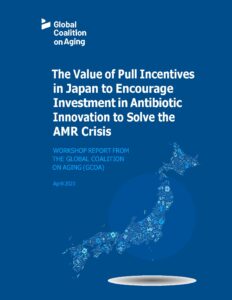AMR is a major health threat in G7 countries, disproportionately impacting people with weakened immune systems, such as aging populations.
 New York, NEW YORK (May 10, 2023) – The Global Coalition on Aging, in partnership with JPMA, today announced the release of its roundtable report on the AMR crisis facing G7 countries and the world, “The Value of Pull Incentives in Japan to Encourage Investment in Antibiotic Innovation to Solve the AMR Crisis.” If strong action is not taken to address AMR, we will lose the antibiotics we need to cure infections, which is likely to outpace cancer as a major cause of death, killing an estimated 10 million by 2050.
New York, NEW YORK (May 10, 2023) – The Global Coalition on Aging, in partnership with JPMA, today announced the release of its roundtable report on the AMR crisis facing G7 countries and the world, “The Value of Pull Incentives in Japan to Encourage Investment in Antibiotic Innovation to Solve the AMR Crisis.” If strong action is not taken to address AMR, we will lose the antibiotics we need to cure infections, which is likely to outpace cancer as a major cause of death, killing an estimated 10 million by 2050.
“Antimicrobial resistance is a serious challenge to all of us, but specifically to the promise of healthy aging,” said Michael Hodin, CEO of the Global Coalition on Aging. “G7 Leaders have an opportunity to solve this health crisis for everyone before it’s too late. We need unique policy levers and specific incentives to correct for the dangerous loss of antibiotic innovation.”
The Global Coalition on Aging (GCOA) convened a private workshop of experts and officials from Japan, Sweden, the United Kingdom, Italy and the United States to discuss how pull incentives within Japan and around the G7 could reinvigorate antibiotic innovation.
They found that:
- The antimicrobials market can be revitalized by pull incentives worth between US$2.2 and US$4.5 billion per drug, paid over 10 years. This can be achieved if G7 countries contribute their fair share of funding to new incentives. As this year’s G7 Leader, Roundtable Participants called on Japan, especially, to meet its fair share of global funding (US$443 million per drug).
- It is estimated that the world needs at least six new antimicrobial innovations per decade to make serious progress to solve the AMR crisis. This will only be possible through further funding for “pull” incentives, which delink revenue from sales volume, making it possible for manufacturers to support continued antimicrobial innovation without needing to actively sell new antimicrobials.
- Antimicrobial incentives produce tremendous returns on investment for the societies that create them. Pull incentives will help countries around the world avoid serious economic and fiscal problems in the future due to AMR.
Antimicrobials, the foundation of modern healthcare systems, helped add an estimated average of 23 years to lifespans across the world during the latter part of the 20th century. An average one-fifth of G7 populations are currently over the age of 65, and as these societies age, they become more vulnerable to an infection without cure. At the same time, the effectiveness of antimicrobials is in crisis – the last time an entirely new class of antimicrobials was discovered was in the 1980s – weakening the ability of antimicrobials to treat infections.
The cost of inaction on antimicrobial innovation is far higher than the cost of action. In Japan, it is estimated that 19,600 deaths occur annually from just six priority pathogens with growing resistance to antimicrobials, at a cost to the health system of US$69,000 per death. Based on the cost of lost lives and costs to health systems of treatment, if Japan supported 18 new antimicrobials over a 30-year program with a fair share incentive of US$443 million per drug, the economic impact of that program would be US$8.92 billion and it would save 270,000 lives in Japan alone – a 28:1 return on investment (ROI). Across the entire G7, the ROI would be 23:1 over 30 years.
To read the report, please click here
About the Global Coalition on Aging
The Global Coalition on Aging aims to reshape how global leaders approach and prepare for the 21st century’s profound shift in population aging. GCOA uniquely brings together global corporations across industry sectors with common strategic interests in aging populations, a comprehensive and systemic understanding of aging, and an optimistic view of its impact. Through research, public policy analysis, advocacy, and strategic communications, GCOA is advancing innovative solutions and working to ensure global aging is a path for fiscally sustainable economic growth, social value creation and wealth enhancement.
For more information, visit: www.globalcoalitiononaging.com
 Global Coalition On
Global Coalition On